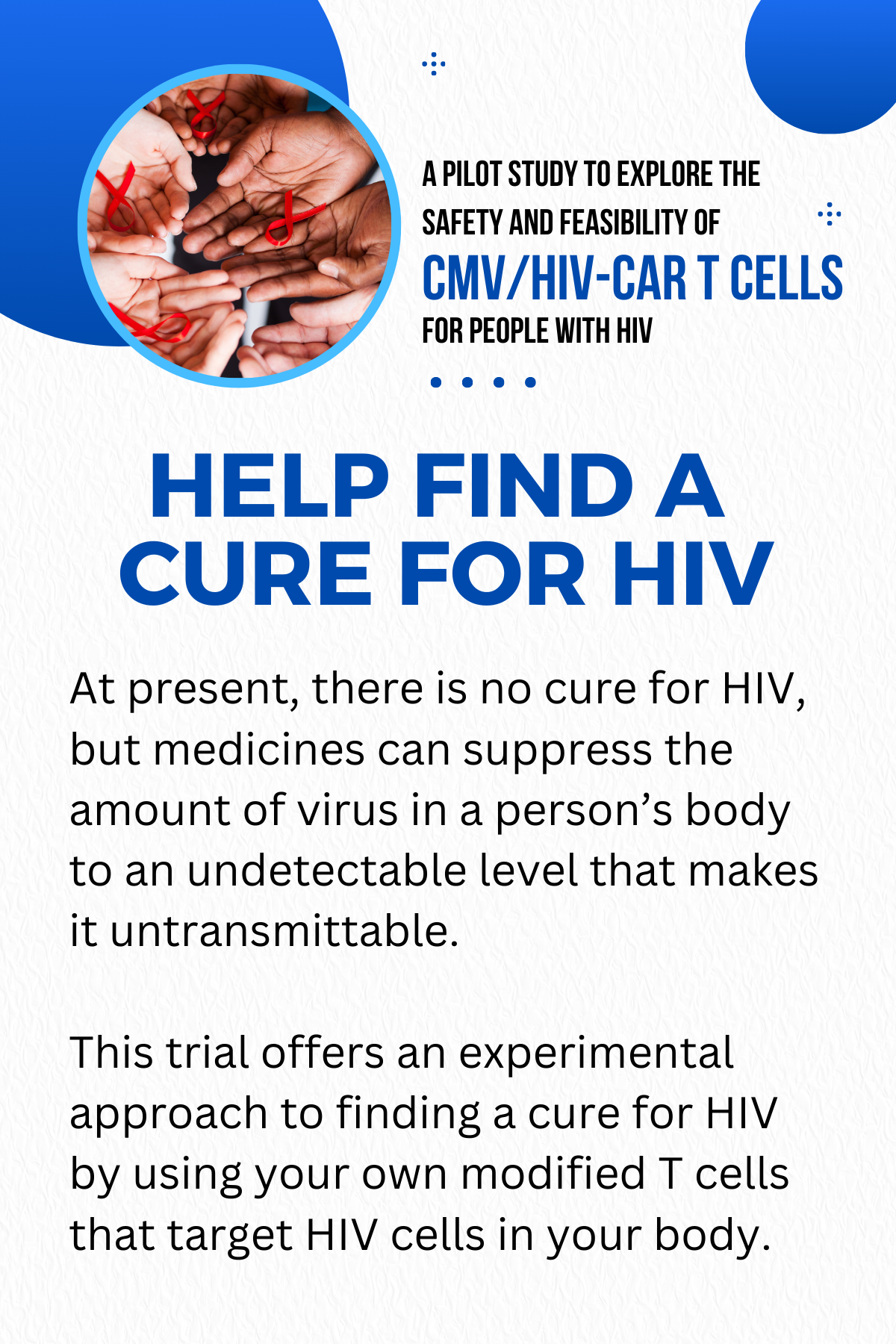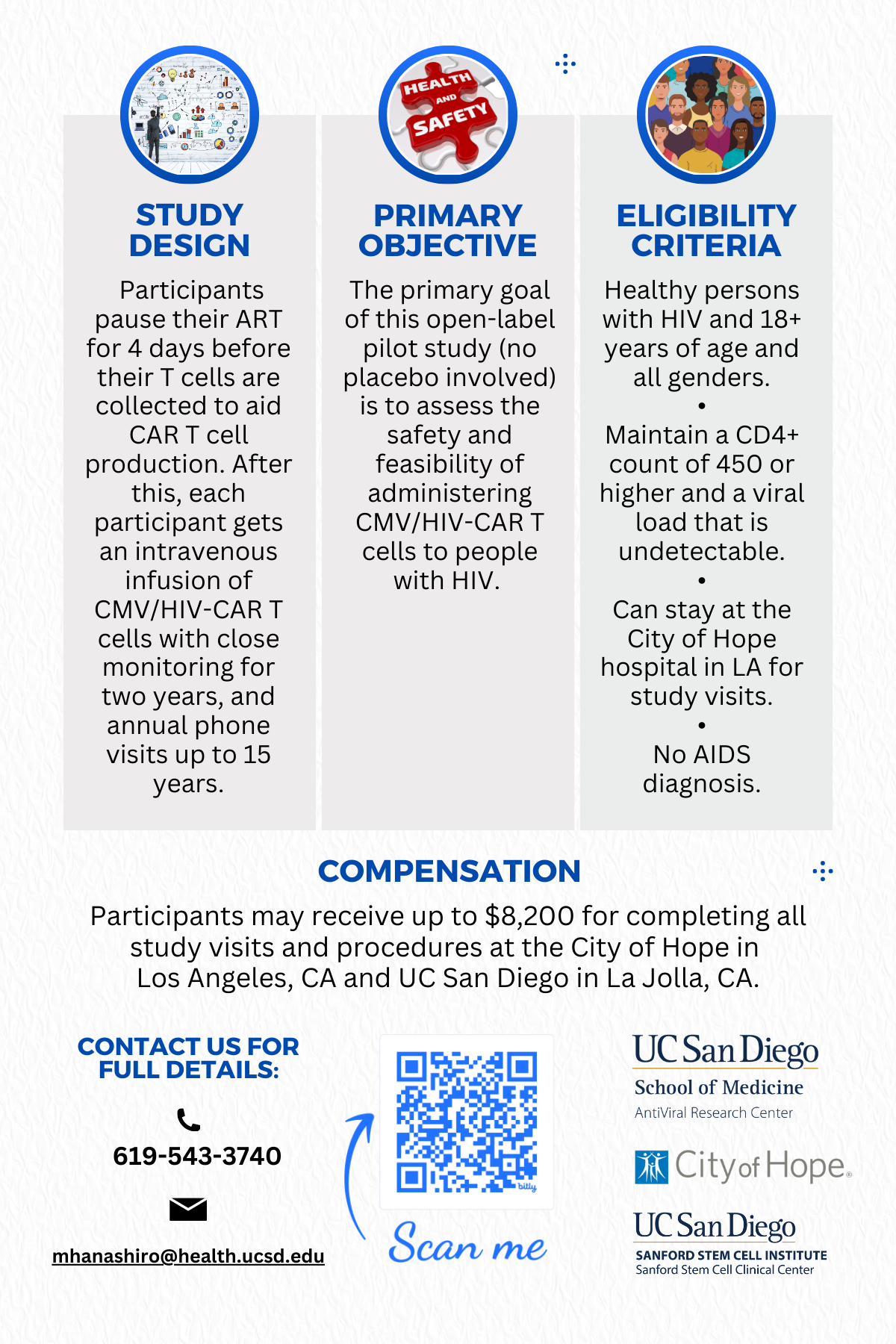CMV-HIV CAR T Cell Study
A Pilot Study to Explore the Safety and Feasibility of CMV/HIV-CAR T Cells for People With HIV


Background
Current antiretroviral therapy (ART) does not cure HIV. It just holds the virus in check so it cannot multiply and destroy the immune system. Unlike other HIV therapeutic approaches, adoptive cellular immunotherapy using CAR T cells engineered to target HIV holds promise for effectively eliminating the virus. However, CAR T cells tend to decrease if they are not continuously stimulated. Interestingly, many people with HIV also have cytomegalovirus (CMV), and CMV-specific T cells remain active due to CMV antigen stimulation. This study explores the idea of using CMV-specific T cells to maintain the presence of autologous bispecific CMV/HIV-CAR T cells in individuals with HIV.
Study Design
This is a first in-human, open-label pilot study that does not have a placebo and focuses on evaluating the safety and feasibility of CMV/HIV-CAR T cells in people with HIV. Eligible participants temporarily interrupt their ART regimen for 4 days to facilitate the production of the CAR T cells. After this, each participant receives an intravenous infusion of autologous CMV/HIV-CAR T cells at study entry and is followed very closely over the next two years. Annual phone visits will continue through year 15.
Purpose of this Study
The primary goal of this trial is to assess the safety of administering autologous CMV/HIV-CAR T cells to people with HIV. This includes a thorough evaluation of potential toxicities, their nature, frequency, severity, timing, and duration.
Abbreviated Requirements to Enter Study
Things that must be true about you:
- Be a person with HIV and 18 years of age or older with undetectable HIV viral loads for the past 48 weeks.
- Maintain a CD4+ cell count of 450 or higher.
- Be willing to temporarily interrupt your ART regimen for four days before leukapheresis.
- Not be pregnant or breastfeeding or planning to get pregnant.
- Must have a caregiver that can live with and monitor the participant 24/7 for two weeks at the City of Hope in Duarte, CA (Los Angeles County).
Abbreviated Exclusion Criteria
Things that cannot be true about you:
- The presence of specific, concurrent illnesses or comorbid conditions which will be reviewed with potential participants.
- A history of CD4+ cell count < 200 or an AIDS diagnosis.
- A history of resistance to two or more classes of antiretroviral drugs.
- Currently on non-nucleoside reverse transcriptase inhibitors (NNRTI).
- A history of prior receipt of an experimental HIV-1 or CMV-MVA vaccine, immunotherapeutic agent, or gene therapy product within the past 1 year.
- Poor vascular access.
Intervention
After a temporary interruption of ART (4 days), T cells are extracted from your blood through a process called leukapheresis. From that extraction, the CMV/HIV-CAR T cells are manufactured which can take up to 8 weeks. After this is completed, study visits are as follows:
- Day 0: Infusion of CMV/HIV-CAR T cells at the City of Hope (COH) in Duarte, CA.
- Day 1-14: Safety monitoring at COH with a caregiver brought by the participant.
- Day 21, 28, and 60: Physical exam and blood draw at COH.
- Week 5, 6, and 7: Physical exam and blood draw at the UC San Diego CIRM Alpha Clinic in La Jolla, CA.
- Long-term follow-up visits up to 15 years will be conducted at the UC San Diego CIRM Alpha Clinic.
Compensation
Participants will receive $200 per study visit and an additional $250 for both the leukapheresis and the infusion. From Day 1 to Day 14, participants and their companion will both receive $200 per day and a place to stay while in Los Angeles County at City of Hope (COH). Travel reimbursement provided for Southern California region.
Study Contact
Marvin Hanashiro
(619) 543-3740
mhanashiro@health.ucsd.edu
